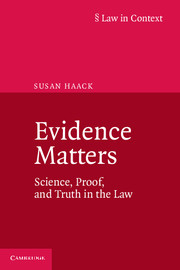Book contents
- Frontmatter
- Epigraph
- Contents
- Acknowledgments
- Introduction: A Pragmatist Perspective on Science, Proof, and Truth in the Law
- 1 Epistemology and the Law of Evidence
- 2 Epistemology Legalized
- 3 Legal Probabilism
- 4 Irreconcilable Differences? The Troubled Marriage of Science and Law
- 5 Trial and Error
- 6 Federal Philosophy of Science
- 7 Peer Review and Publication
- 8 What’s Wrong with Litigation-Driven Science?
- 9 Proving Causation
- 10 Correlation and Causation
- 11 Risky Business
- 12 Nothing Fancy
- Cases Cited
- Statutes, etc., Cited
- Bibliography
- Glossary
- Index
- References
1 - Epistemology and the Law of Evidence
Problems and Projects
Published online by Cambridge University Press: 05 August 2014
- Frontmatter
- Epigraph
- Contents
- Acknowledgments
- Introduction: A Pragmatist Perspective on Science, Proof, and Truth in the Law
- 1 Epistemology and the Law of Evidence
- 2 Epistemology Legalized
- 3 Legal Probabilism
- 4 Irreconcilable Differences? The Troubled Marriage of Science and Law
- 5 Trial and Error
- 6 Federal Philosophy of Science
- 7 Peer Review and Publication
- 8 What’s Wrong with Litigation-Driven Science?
- 9 Proving Causation
- 10 Correlation and Causation
- 11 Risky Business
- 12 Nothing Fancy
- Cases Cited
- Statutes, etc., Cited
- Bibliography
- Glossary
- Index
- References
Summary
As for the philosophers, they make imaginary laws for imaginary commonwealths; and their discourses are as the stars, which give little light, because they are so high.
—Francis BaconEven today, more than four centuries later, Bacon’s complaint still resonates. Now, as then, the writings of philosophers—even of philosophers of law, who might be expected to be a little more grounded in the real world—all too often “give little light, because they are so high.” I will try to buck this trend by showing you that epistemological ideas really can illuminate real-life legal issues.
IDENTIFYING EPISTEMOLOGICAL ISSUES IN THE LAW
Every legal system needs, somehow, to determine the truth of factual questions. At one time, courts in England and continental Europe relied on in-court tests—“proof” in the old meaning of the English word (a meaning that still survives in descriptions of liquor as “80% proof,” and in the old proverb “the proof of the pudding is in the eating”). In trial by oath, a defendant would be asked to swear on the testament or on a reliquary that he was innocent, and “oath-helpers” or “con-jurors” might be called to swear that his oath wasn’t foresworn; in trial by ordeal, a defendant might be asked, e.g., to pick up a ring from the bottom of a cauldron of boiling water, and his arm would later be checked to determine whether it had healed cleanly or had festered—which supposedly showed that he was guilty; in trial by combat, the two parties to a case would literally fight it out.
- Type
- Chapter
- Information
- Evidence MattersScience, Proof, and Truth in the Law, pp. 1 - 26Publisher: Cambridge University PressPrint publication year: 2014
References
- 1
- Cited by



